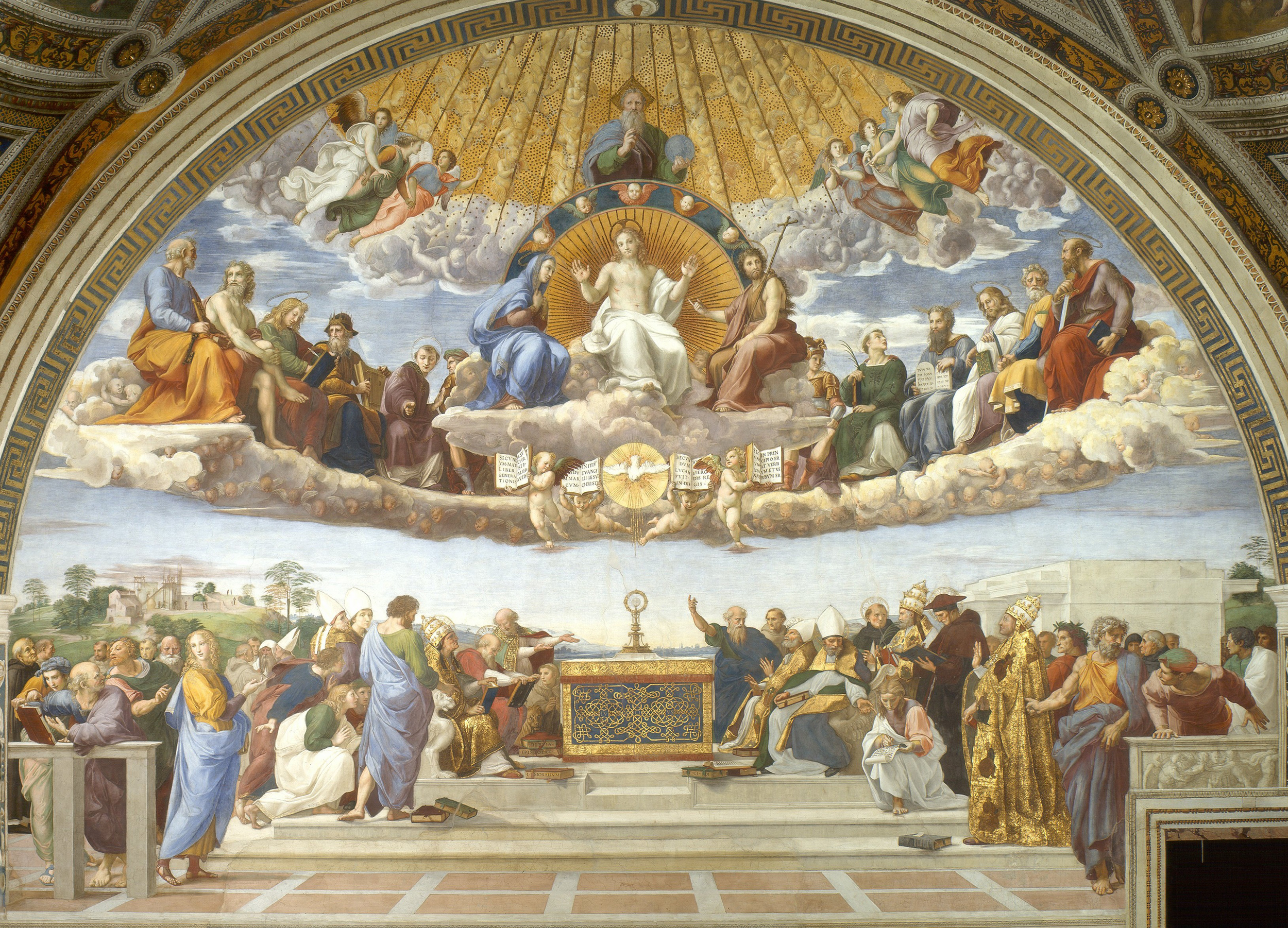
Corpus Christi
In the week after Trinity Sunday, the Church celebrates Jesus Christ’s True Presence in the Eucharist. During the Canon of the Mass, the bread and wine in the hands of the priest become the Body, Blood, Soul, and Divinity of Jesus Christ. Even though the Eucharist still looks, feels, and tastes like bread and wine, they have ceased to be bread and wine. We consume in reality the Person represented as a little child in the manger, as a bloody form on the cross, and as gloriously triumphant in images of the Resurrection.
The Eucharist is not a mere sign or symbol; It really is Jesus Christ Himself. When the priest elevates the host, we are looking at Jesus Christ Himself. When the host touches our tongue, we are touching Jesus Christ Himself.
The feast is called Corpus Christi for the Latin for “The Body of Christ.” These are the words priests and deacons use when distributing communion.
How to Receive Holy Communion
Corpus Christi is a good time to review how we are to receive the Body and Blood of Christ.
Corpus Christi Procession
On the Feast of Corpus Christi, parishes around the world triumphantly process with Jesus Christ in the Eucharist. We pay homage to the King of the Universe in a royal procession. The priest places Him in the monstrance (large metal vessel for displaying Jesus), then, wearing a cope (long cape) and humeral veil (cloth between his hands and the monstrance), he processes with the congregation out of the church. He walks beneath a canopy to protect and honor Jesus. Altar servers surround the canopy with torches and incense. The congregation follows, chanting hymns in honor of Our Lord.
The Eucharistic procession is a public demonstration that we truly believe what Christ taught: that what appears to be bread and wine really is His Body, Blood, Soul, and Divinity. Why else would we treat a wafer like a king in a royal parade?
At St. Joseph, the procession will occur on Sunday, June 2, immediately following the Noon Mass. The 1.1-mile route will lead through the city streets, with one stop along the way, ending at the chapel. The procession will be escorted by the Waxahachie police and fire departments.
How to Act in a Procession
The child saint Dominic Savio was kneeling once as the Eucharist passed by, and he noticed a soldier remaining standing. When asked about his behavior, the soldier made an excuse: he was wearing brand-new pants and couldn’t kneel in the mud. The boy Dominic took out his handkerchief and laid it on the ground. With no excuses left, the soldier knelt on the handkerchief.
If you are standing on the side of the road as a procession passes with the Eucharist, you should kneel until our Lord has passed.
Whether watching a procession or walking in it, men must remove any head covering. It is appropriate for women wearing a form of head covering to leave it on.
The procession is a wonderful opportunity for prayer. Give thanks to God for His gift on Calvary and in the Eucharist. Praise Him and glorify Him for His awesome majesty. Give Him the honor that is His due. Pray for the conversion of sinners and unbelievers, and that we and the entire local community may live and act like Christ is our king.
Procession route, traveling clockwise from the church to the chapel
Pange Lingua Gloriosi
One of the hymns we will chant several times in the procession is the Pange Lingua Gloriosi, the great hymn of praise of the Eucharist written by St. Thomas Aquinas. The last two stanzas are often chanted independently as the Tantum Ergo.
PANGE, lingua, gloriosi
Corporis mysterium,
Sanguinisque pretiosi,
quem in mundi pretium
fructus ventris generosi
Rex effudit Gentium.
Nobis datus, nobis natus
ex intacta Virgine,
et in mundo conversatus,
sparso verbi semine,
sui moras incolatus
miro clausit ordine.
In supremae nocte cenae
recumbens cum fratribus
observata lege plene
cibis in legalibus,
cibum turbae duodenae
se dat suis manibus.
Verbum caro, panem verum
verbo carnem efficit:
fitque sanguis Christi merum,
et si sensus deficit,
ad firmandum cor sincerum
sola fides sufficit.
Tantum ergo Sacramentum
veneremur cernui:
et antiquum documentum
novo cedat ritui:
praestet fides supplementum
sensuum defectui.
Genitori, Genitoque
laus et iubilatio,
salus, honor, virtus quoque
sit et benedictio:
procedenti ab utroque
compar sit laudatio.
Amen. Alleluia.
SING, my tongue, the Savior's glory,
of His flesh the mystery sing;
of the Blood, all price exceeding,
shed by our immortal King,
destined, for the world's redemption,
from a noble womb to spring.
Of a pure and spotless Virgin
born for us on earth below,
He, as Man, with man conversing,
stayed, the seeds of truth to sow;
then He closed in solemn order
wondrously His life of woe.
On the night of that Last Supper,
seated with His chosen band,
He the Pascal victim eating,
first fulfills the Law's command;
then as Food to His Apostles
gives Himself with His own hand.
Word-made-Flesh, the bread of nature
by His word to Flesh He turns;
wine into His Blood He changes;-
what though sense no change discerns?
Only be the heart in earnest,
faith her lesson quickly learns.
Down in adoration falling,
Lo! the sacred Host we hail;
Lo! o'er ancient forms departing,
newer rites of grace prevail;
faith for all defects supplying,
where the feeble sense fail.
To the everlasting Father,
and the Son who reigns on high,
with the Holy Ghost proceeding
forth from Each eternally,
be salvation, honor, blessing,
might and endless majesty.
Amen. Alleluia.
